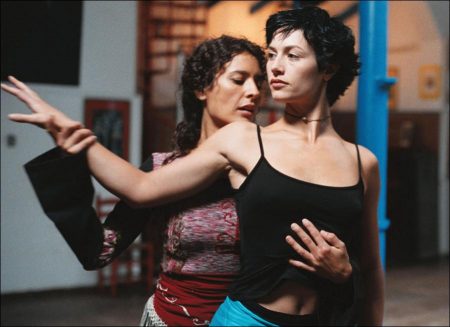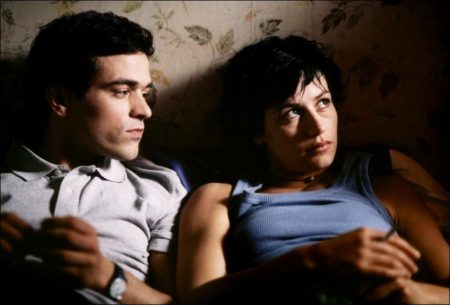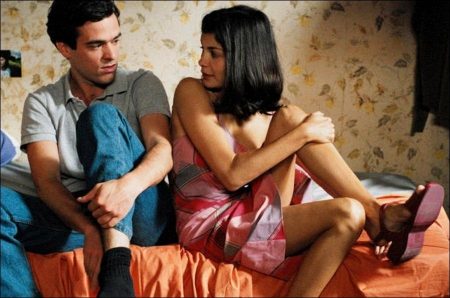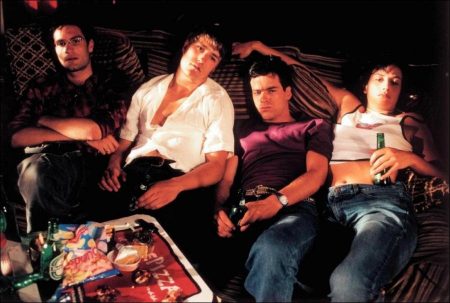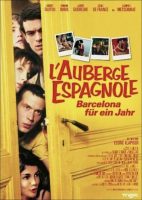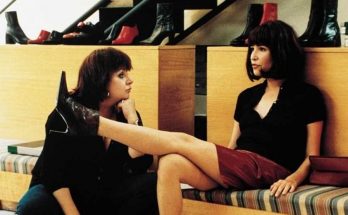Taglines: Je ne sais pas pourquoi le monde est devenu un tel bordel.
L’Auberge Espagnole movie storyline. As part of a job that he is promised, Xavier, an economics student in his twenties, signs on to a European exchange program in order to gain working knowledge of the Spanish language. Promising that they’ll remain close, he says farewell to his loving girlfriend, then heads to Barcelona. Following his arrival, Xavier is soon thrust into a cultural melting pot when he moves into an apartment full of international students. An Italian, an English girl, a boy from Denmark, a young girl from Belgium, a German and a girl from Tarragona all join him in a series of adventures that serve as an initiation to life.
L’Auberge Espagnole released in some English-speaking territories as Pot Luck or The Spanish Apartment) is a 2002 French-Spanish film directed and written by Cédric Klapisch. It is a co-production between Spain (Mate Producciones S.A., Via Digital) and France (BAC Films, Ce qui me meut, France 2 Cinéma, Studio Canal).
The movie is about an economics graduate student studying for a year in Barcelona, Spain, as part of the Erasmus programme, where he encounters and learns from a group of students who hail from all over Western Europe. It is the first part of the self-titled “Spanish Apartment Trilogy” of films centered on the character of Xavier and his progression from student to family man and friends he initially encounters in a student share-house in Spain.
The film’s portrayal is in the first-person perspective of the main character, Xavier, and is hence mainly narrated in French. Some of the dialogue is in English and a significant amount is in Spanish, as well as small amounts in Catalan, Danish, German and Italian. L’Auberge Espagnole is the first part of the Spanish Apartment trilogy, its two sequels being: Russian Dolls (2005) and Chinese Puzzle (2013).
The phrase auberge espagnole literally means “Spanish inn” or “Spanish hostel”. It is a French idiomatic expression originally referring to a place where you can only eat what you bring and by extension, a place or situation where you only find what you brought. A second, more neutrally connoted and recent interpretation of the phrase is a dinner diversified by the fact that each guest has contributed some part of the meal; this suggests the English-language idea of a “potluck,” earning the film this title in some English-speaking areas. A third meaning of auberge espagnole is a common resting area for travelers from a variety of different cultures and regions.[8] The more direct translation as “The Spanish Apartment” is also playing on the French phrase, since the main characters are all literally sharing an apartment in Spain.
Film Review for L’Auberge Espagnole
Much of the action in ”L’Auberge Espagnole” takes place in a communal flat in Barcelona populated by a mix-and-match assortment of attractive young Europeans. The film’s digital video look, its jumpy editing and its focus on matters of household politics — dividing up space in the refrigerator, managing sexual tension and differences of temperament — make it resemble a season of ”The Real World Catalonia” telescoped into two hours.
Like ”The Real World,” that perennial, pioneering MTV reality series, ”L’Auberge Espagnole,” written and directed by Cédric Klapisch, zeroes in on the life-cycle dramas of the early 20’s, that phase of life when, at least in the affluent nations of the West, young people have reached legal adulthood without having quite grown up.
Xavier (Romain Duris) is an intense, not entirely likable young Parisian with divorced parents, vague ambitions and a companionable, not entirely likable girlfriend (Audrey Tautou). After learning from a friend of his father that mastery of Iberian economic policy will assure him a good job in the European administrative bureaucracy, Xavier enrolls in an exchange program in Barcelona. At the airport, he meets a smug French neurologist whose shy young wife, Anne Sophie (Judith Godrèche), will be the source of some subsequent romantic complications.
Of these there is no shortage, especially once Xavier finds his new roommates, who resemble a bohemian delegation to the European Parliament. Indeed, the apartment, like the movie itself, serves as a cheery metaphor for the new, transnational European identity. The Englishwoman, Wendy (Kelly Reilly), is a bit standoffish, as if she were not fully part of the community. (She also has a fling with an American street musician, whom Xavier views with disdain.) The Danish guy, his Spanish girlfriend and the Italian stoner hover about the periphery. Xavier, a latecomer to the scene, soon emerges as first among equals, the de facto leader of this happy polyglot tribe. Naturellement. (The German fellow is a little too uptight.)
Xavier also forms a Francophone alliance with Isabelle (Cécile de France), a Belgian lesbian who teaches him how to seduce Anne Sophie. Her macho techniques, which might bring a charge of sexual harassment at an American university, are surprisingly effective. But Xavier never achieves the rapport with Anne Sophie, whom he views as ignorant and unhip, that he does with Isabelle. ”I wish you were a woman,” she says to him.
He says, ”The world is badly made.”
For its part, ”L’Auberge Espagnole,” which opens today nationwide, is a bit shapeless and sloppy, losing track of some interesting subplots and throwing in extraneous fantasy sequences and voice-overs. Mr. Klapisch’s ragged exuberance seems well matched to his subject, though, and he does pull off one moment of sustained farce involving the unexpected arrival of Wendy’s boyfriend from back home. (Most of the housemates are visited at some point by a boy- or girlfriend from back home, and the visits rarely go well.)
He also has an intuitive sense of how seriously to take his characters’ lives. He mocks them without belittling them and registers the gravity of their emotions without succumbing (as they sometimes do) to the temptations of melodrama.
”L’Auberge Espagnole” presents an appealing and persuasive picture of European integration, in which national differences, which once sparked military and political conflict, are preserved because they make life sexier and more interesting. The ending, though, feels like a bit of a cop-out, as Mr. Klapisch decides that Xavier’s pleasant year abroad must yield a lesson. The ending suggests that the bureaucratic routines of Xavier’s job with the European Union are antithetical to the freedom and chaos he savored in Barcelona. They are, but only superficially, since they are aspects of the same phenomenon: the transformation of Europe from a battleground to a consumerist, hedonist playground.
L’Auberge Espagnole (2003)
Directed by: Cédric Klapisch
Starring: Romain Duris, Cecile De France, Judith Godriche, Audrey Tautou, Kelly Reilly, Xavier De Guillebon, Kevin Bishop, Federico D’Anna, Christian Pagh, Cristina Brondo
Screenplay by: Cédric Klapisch
Production Design by: François Emmanuelli, Victoria Borrás
Cinematography by: Dominique Colin
Costume Design by: Anne Schotte
Makeup Department: Manuela Taco
Music by: Ardag, Loïc Dury, Cyril Moisson
MPAA Rating: R for language and sexual content.
Distributed by: Fox Searchlight Pictures
Release Date: June 20, 2003
Views: 295
